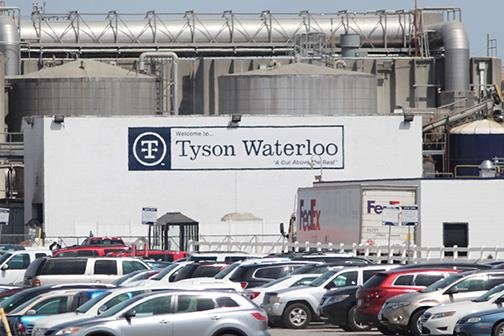Tyson Foods suspended operations Wednesday at an Iowa plant that is critical to the nation's pork supply but was blamed for fueling a coronavirus outbreak in the region.
The Arkansas company said the closure of the plant in Waterloo would deny a vital market to hog farmers and further disrupt the U.S. meat supply. Tyson had kept the facility, its largest pork plant, open in recent days over the objections of alarmed officials.
The plant can process 19,500 hogs per day, accounting for 3.9% of U.S. pork processing capacity, according to the National Pork Board.
More than 180 infections have been linked to the plant, and officials expect that number to rise. Testing of its 2,800 workers is expected to begin Friday. Cases and hospitalizations in Black Hawk County have skyrocketed in recent days, and officials say the plant is the source of most infections.
[CORONAVIRUS: Click here for our complete coverage » arkansasonline.com/coronavirus]
In addition to those who have tested positive for the virus, hundreds of workers were staying home out of fear, and the plant had been running at reduced production levels.
Employers have struggled to contain the virus in meatpacking plants, where workers toil side by side on production lines and often share crowded locker rooms, cafeterias and rides to work. While plants have added safety measures, public-health experts say social distancing is virtually impossible.
Several facilities have temporarily closed because of virus outbreaks, including a Smithfield Foods plant in Sioux Falls, S.D., a JBS USA plant in Worthington, Minn., and a Redwood Farms Meat Processors in Estherville, Iowa. Others have stayed open or resumed production after pauses for testing and cleaning.
PROCESSING SLASHED
An estimated 25% of U.S. pork processing capacity has been closed or idled because of reduced operating speed over the past two days, said Steve Meyer, an economist with Kerns and Associates in Ames, Iowa.
[Video not showing up above? Click here to watch » https://www.youtube.com/watch?v=OFHRELA_iiw]
As a result, prices are starting to increase, and analysts warn that customers could soon see shortages of certain products at grocery stores. At the same time, hog prices are plummeting because of excess supply, devastating farmers.
In Kansas, a beef production state, an official said Wednesday that 168 meatpacking workers had tested positive to date. In Missouri, two rural counties that are home to several meatpacking plants reported spikes in infections.
Saline County on Wednesday reported 96 cases of covid-19, the illness caused by the coronavirus. Moniteau County reported 55 cases, citing 29 as confirmed and 26 as "probable." Neither county has reported a death.
While the vast majority of Missouri cases have been in the largest cities and their suburbs, data provided by Saline and Moniteau counties showed that they have the highest per-capita rates of infection in the state -- 419 cases per 100,000 residents in Saline County, and 341 cases per 100,000 residents in Moniteau County.
'SIGNIFICANT RAMIFICATIONS'
Steve Stouffer, president of the Tyson Fresh Meats unit, said that its Waterloo closure was driven by "the combination of worker absenteeism, covid-19 cases and community concerns." He warned of "significant ramifications" for farmers, distributors and grocers in the supply chain.
Tyson said workers would be compensated during the shutdown and that the timing of reopening would depend on several factors, including testing.
Officials, including Waterloo Mayor Quentin Hart and the Black Hawk County Board of Health, had called on Tyson or Republican Gov. Kim Reynolds to temporarily close the plant. They had warned that its continued operation would exacerbate the spread of the virus and that the company was endangering its workers.
A 65-year-old employee in the plant's laundry department died Sunday after contracting the virus, the Waterloo-Cedar Falls Courier reported.
The governor blocked local authorities from closing the plant in an April 16 order that banned social gatherings in northeastern Iowa. It granted the exclusive power to the Iowa Department of Public Health to shut down businesses over coronavirus concerns.
The governor and the department had been working with Tyson to keep the plant open.
ECONOMY VS. HEALTH
Reynolds argued that the economic disruption caused by plant closures outweighed the health risks, warning that farmers might have to euthanize their pigs. She said "people are gonna get" the virus in large workplaces but most will experience mild or no symptoms.
While it's true that for most people, the virus causes mild or moderate symptoms that clear up in a few weeks, it can lead to more severe illness and even death for some, especially older adults and those with existing health problems.
Lawmakers said an earlier closure would have better protected public health and been less harmful economically. "My concern is the impact this has had because we didn't act soon enough," said Democratic Rep. Ras Smith of Waterloo.
The governor didn't respond directly when asked Wednesday if the state should have intervened. She defended her overall response to the crisis but said, "there's always more we could have done."
Tyson resumed operations Tuesday at its pork plant in Columbus Junction, Iowa, which had been shut down for two weeks after an outbreak infected hundreds and killed two workers.
Information for this article was contributed by David Pitt, Jim Salter and Roxana Hegeman of The Associated Press.
Business on 04/23/2020

